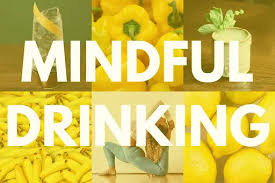Mindful drinking is a growing trend that encourages individuals to take a more conscious approach to their alcohol consumption. It focuses on understanding why, when, and how you drink, allowing you to make informed decisions that align with your personal health and lifestyle goals. Whether you want to cut back on drinking, maintain a healthier balance, or simply become more aware of your habits, mindful drinking offers practical strategies for achieving these objectives.
Understanding the Concept of Mindful Drinking

Mindful drinking involves being present and intentional with your alcohol choices. It’s not about complete abstinence unless that aligns with your goals, but rather about being aware of your drinking habits and their effects on your body and mind. This approach can help you enjoy alcohol in moderation, reduce negative consequences, and even improve your relationship with drinking.
At its core, mindful drinking encourages individuals to reflect on their motivations for drinking. Are you drinking to celebrate, to cope with stress, or out of habit? By identifying these triggers, you can make more deliberate choices and find healthier alternatives when needed.
Benefits of Mindful Drinking
Practicing mindful drinking comes with several benefits, both physical and emotional. These advantages extend beyond just reducing alcohol consumption:
- Improved Physical Health: Drinking mindfully can lead to better overall health, including reduced risks of liver damage, heart disease, and weight gain. It also helps improve sleep quality, which can be negatively affected by excessive alcohol consumption.
- Enhanced Mental Clarity: Excessive alcohol use can cloud judgment and decision-making. Mindful drinking encourages clearer thinking and better emotional regulation.
- Stronger Social Connections: By drinking less or being more intentional, you may find it easier to engage in meaningful conversations and connections with others.
- Greater Self-Control: Practicing mindfulness allows you to develop self-discipline, which can extend to other areas of your life, such as eating habits or exercise routines.
Recognizing Triggers for Drinking
Understanding what triggers your desire to drink is a fundamental aspect of mindful drinking. Triggers can be internal or external, and identifying them can help you develop strategies to address them.
- Social Situations: Social gatherings often encourage drinking as part of the festivities. Being aware of the social pressure and setting boundaries can help you navigate these situations.
- Emotional States: Many people turn to alcohol to cope with stress, anxiety, or sadness. Mindful drinking helps you recognize these emotions and seek healthier ways to manage them, such as exercise, meditation, or talking to a friend.
- Habitual Patterns: For some, drinking becomes a routine, such as enjoying a glass of wine every evening. Being mindful of these habits can help you decide whether they are truly beneficial or simply ingrained behaviors.
Setting Personal Goals for Mindful Drinking

Establishing clear, achievable goals is essential for practicing mindful drinking. These goals should align with your lifestyle and health objectives, whether that means reducing your alcohol intake, drinking only on special occasions, or eliminating alcohol altogether.
- Define Your Limits: Decide how many drinks you feel comfortable consuming in a given week or social setting. Stick to these limits to maintain control.
- Choose Alcohol-Free Days: Designating specific days as alcohol-free can help you break habitual patterns and give your body a break.
- Reflect on Motivations: Ask yourself why you are drinking in any given situation. Is it out of enjoyment, boredom, or social expectation? Understanding your motivations helps you make intentional choices.
Exploring Alternatives to Alcohol
One of the best ways to support mindful drinking is by exploring alternatives to traditional alcoholic beverages. With the rise of non-alcoholic options, it’s easier than ever to find satisfying substitutes.
- Mocktails: These non-alcoholic cocktails provide all the flavor and presentation of traditional drinks without the alcohol.
- Non-Alcoholic Beers and Wines: Many brands now offer high-quality, alcohol-free versions of their popular products.
- Infused Waters and Teas: Experimenting with flavored waters or herbal teas can be a refreshing alternative to alcohol.
- Sparkling Water with Fruit: Adding fresh fruit or herbs to sparkling water creates a festive, flavorful drink that feels special.
Practicing Mindfulness Techniques While Drinking
Mindfulness is about being fully present in the moment, and this can extend to your drinking habits. By practicing mindfulness techniques, you can become more aware of how alcohol affects you and make more deliberate choices.
- Savor the Experience: Take the time to enjoy the flavors, aromas, and textures of your drink. Drinking slowly allows you to fully appreciate the experience and avoid overindulging.
- Pause Between Drinks: Before reaching for another drink, take a moment to assess whether you really want or need it. This pause gives you time to reflect on your goals and physical state.
- Stay Hydrated: Alternate alcoholic beverages with water to stay hydrated and reduce the likelihood of overdrinking.
- Be Aware of Your Environment: Pay attention to how your surroundings influence your drinking habits. Social cues, music, and atmosphere can all affect your choices.
Communicating Your Choices to Others

One of the challenges of mindful drinking can be dealing with social pressure or expectations. Communicating your intentions clearly and confidently can help you navigate these situations.
- Be Honest: Let friends and family know about your mindful drinking goals. Most people will respect your decisions and support your efforts.
- Have a Response Ready: If someone offers you a drink, be prepared with a polite response, such as, “I’m taking a break from alcohol tonight,” or “I’m sticking to water for now.”
- Bring Your Own Drinks: In social settings, bringing a non-alcoholic option you enjoy ensures you have something to sip on and helps you stay aligned with your goals.
Monitoring and Adjusting Your Habits
Mindful drinking is not a one-size-fits-all approach. It’s important to monitor your habits and adjust them as needed to suit your lifestyle and goals.
- Keep a Journal: Tracking your alcohol intake and reflecting on your experiences can provide valuable insights into your drinking patterns and progress.
- Celebrate Small Wins: Acknowledge and celebrate your achievements, whether it’s reducing the number of drinks you have in a week or successfully navigating a social event without overindulging.
- Seek Support: If you find it challenging to practice mindful drinking on your own, consider joining a supportive community or seeking guidance from a health professional.
Long-Term Benefits of Mindful Drinking
Over time, practicing mindful drinking can lead to profound changes in your overall well-being. The physical health benefits, including improved liver function, better sleep, and reduced risk of chronic fatcai99 diseases, are complemented by emotional and mental advantages. You may find yourself feeling more in control, more present, and more connected to the people and experiences around you.
Mindful drinking is not about deprivation—it’s about empowerment. By making intentional choices and embracing a conscious approach to alcohol, you can enjoy a healthier, more balanced relationship with drinking that enhances your quality of life.
Mindful drinking is a practical and sustainable approach to improving your relationship with alcohol. By focusing on awareness, intentionality, and moderation, you can make smart choices that align with your goals and values. Whether you’re looking to cut back, eliminate alcohol, or simply drink more thoughtfully, the principles of mindful drinking offer valuable tools for achieving greater balance and well-being.







